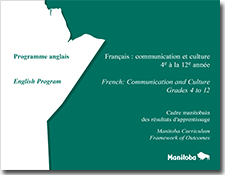Contents on this Page
French: Communication and Culture
Manitoba Curriculum Framework of Outcomes
Grades 4 to 12
French: Communication and Culture, Grades 4 to 12 – The purpose of this framework is twofold: to set out the philosophical and pedagogical foundations for learning French in the English program schools that offer the course and to present general and specific learning outcomes as well as achievement indicators, acts of communication, and related illustrative examples for learning French.
Posters
French: Communication and Culture (![]() 4.4 MB)
4.4 MB)
This poster provides a snapshot of the course, French: Communication and Culture. It shows how the course places an emphasis on oral communication and the integration of francophone cultures while using a balanced literacy based approach.The poster also describes the themes to explore in the course and the acts of communication that students need to carry out.
Learning Outcomes from Grades 4 to 12 (![]() 220 KB)
220 KB)
This poster illustrates the scaffolding of the learning outcomes for oral communication, reading, writing and culture.
Complete Document (![]() 4.9 MB)
4.9 MB)
Sections of the Document:
Front Matter (![]() 344 KB)
344 KB)
Table of Contents (![]() 136 KB)
136 KB)
Introduction (![]() 277 KB)
277 KB)
Key Pedagogical Elements (![]() 401 KB)
401 KB)
French: Communication and Culture (![]() 404 KB)
404 KB)
Balanced Literacy Approach (![]() 410 KB)
410 KB)
Framework of Outcomes (![]() 821 KB)
821 KB)
Oral Communication (![]() 619 KB)
619 KB)
Reading (![]() 534 KB)
534 KB)
Writing (![]() 530 KB)
530 KB)
Culture (![]() 603 KB)
603 KB)
Bibliography (![]() 187 KB)
187 KB)
Appendix (![]() 2 MB)
2 MB)
| Title | Description | Grade Level | ||||
|---|---|---|---|---|---|---|
| Grade 4 |
Grades 5 & 6 |
Grades 7 & 8 |
Grades 9 & 10 |
Grades 11 & 12 |
||
| Portrait of the Learner | These portraits of the learner provide a global description of students’ skills in oral, reading and writing as well as students’ knowledge of francophone cultures and the advantages of learning French. | |||||
| Learning Outcomes by Grade Level | This chart includes the general and specific learning outcomes. | |||||
| Learning Outcomes by Strand | The framework is divided into four strands: oral communication, reading, writing and culture. Each provides a description of student achievement grouped by grade level(s). It includes the learning outcomes supported by the achievement indicators, the acts of communication and the illustrative examples. | |||||
| Title | Description | Grade Level | ||
|---|---|---|---|---|
| Grades 4 to 6 |
Grades 7 & 8 |
Grades 9 to 12 |
||
| Selection of Resources by Themes | This selection of books and modules is organized by the themes outlined in the framework. | |||
| Selection of Resources by Acts of Communication* | This selection of books and modules is organized by the acts of communication outlined in the framework. |
|
|
|



